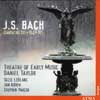Bach Cantatas
Thoughtful interpretations of early Bach from a group on a ‘sacred’ mission
View record and artist detailsRecord and Artist Details
Composer or Director: Johann Sebastian Bach
Genre:
Vocal
Label: ATMA
Magazine Review Date: 2/2003
Media Format: CD or Download
Media Runtime: 57
Mastering:
Stereo
DDD
Catalogue Number: ACD22279

Tracks:
| Composition | Artist Credit |
|---|---|
| Cantata No. 131, 'Aus der Tiefen rufe ich, Herr, z |
Johann Sebastian Bach, Composer
Daniel Taylor, Conductor Daniel Taylor, Alto Jan Kobow, Tenor Johann Sebastian Bach, Composer Stephen Varcoe, Bass Suzie Leblanc, Soprano Theatre of Early Music |
| Cantata No. 152, 'Tritt auf die Glaubensbahn' |
Johann Sebastian Bach, Composer
Daniel Taylor, Alto Daniel Taylor, Conductor Jan Kobow, Tenor Johann Sebastian Bach, Composer Stephen Varcoe, Bass Suzie Leblanc, Soprano Theatre of Early Music |
| Cantata No. 161, 'Komm, du süsse Todesstunde' |
Johann Sebastian Bach, Composer
Daniel Taylor, Alto Daniel Taylor, Conductor Jan Kobow, Tenor Johann Sebastian Bach, Composer Stephen Varcoe, Bass Suzie Leblanc, Soprano Theatre of Early Music |
Author: Jonathan Freeman-Attwood
To ‘bring back the sacredness into the creative process’ is how the Theatre of Early Music describes its quest. These three intensely wrought cantatas could not provide a more fitting opportunity as they traverse the attentive rhetorical world of Bach’s early vocal music. Quite what ‘sacredness’ means for their director, countertenor Daniel Taylor, is hard to know but it would seem from his intimate reading of the antique-style sacred concerto Aus der Tiefen rufe ich, that lucid argument of textual detail and a telling undercurrent of instrumental ‘images’ play an important part in his vision.
This is a work whose contemplative pacing is enhanced by Bach’s seamless and arching plan of movements, delivered in quick succession, each with its disarmingly personal directness; ‘meine Seele harret’ (‘my soul is waiting’) from the second choral section is as close to pure devotion as you get in Bach. Despite the occasional vocal strains of using ‘Chorton’ – a pitch known to be used in Weimar and its environs which raises the key up a significant notch – Taylor’s sensitive approach is musically satisfying in many essential respects even if the voices, individually or collectively as chorus, fail to penetrate the expressive regions of Herreweghe’s exceptional account.
In the other two cantatas, the crystal-clear recorded sound brings out some irresistible qualities in the performances, such as the deeply touching ‘Sinfonia’ to the little-known Tritt auf die Glaubensbahn, where the characterful obbligato recorder, oboe and violin chatter with the sureness of disciples truly treading the path of faith. Again, intimacy of sentiment is key to a successful rendering of these early pieces. The experienced Stephen Varcoe brings veracity of expression to the poet’s unfettered evangelism in the first aria, as does the tenor Jan Kobow in the great prototype ‘longing’ aria from Mein Verlangen, of the kind which Bach was to introduce regularly in his Leipzig cycles.
I’m not certain this repertoire shows off Suzie LeBlanc’s greatest strengths and Taylor himself is a variable vocal presence, though at best a soft-grained and imploring one. With a few vocal quibbles, the instrumental playing is first-rate and whatever ‘sacredness’ means to these musicians, thoughtfulness and conviction permeate these performances. I’m glad to know them. Cantata No 161 is particularly fine and conceptually the most effective version around.
This is a work whose contemplative pacing is enhanced by Bach’s seamless and arching plan of movements, delivered in quick succession, each with its disarmingly personal directness; ‘meine Seele harret’ (‘my soul is waiting’) from the second choral section is as close to pure devotion as you get in Bach. Despite the occasional vocal strains of using ‘Chorton’ – a pitch known to be used in Weimar and its environs which raises the key up a significant notch – Taylor’s sensitive approach is musically satisfying in many essential respects even if the voices, individually or collectively as chorus, fail to penetrate the expressive regions of Herreweghe’s exceptional account.
In the other two cantatas, the crystal-clear recorded sound brings out some irresistible qualities in the performances, such as the deeply touching ‘Sinfonia’ to the little-known Tritt auf die Glaubensbahn, where the characterful obbligato recorder, oboe and violin chatter with the sureness of disciples truly treading the path of faith. Again, intimacy of sentiment is key to a successful rendering of these early pieces. The experienced Stephen Varcoe brings veracity of expression to the poet’s unfettered evangelism in the first aria, as does the tenor Jan Kobow in the great prototype ‘longing’ aria from Mein Verlangen, of the kind which Bach was to introduce regularly in his Leipzig cycles.
I’m not certain this repertoire shows off Suzie LeBlanc’s greatest strengths and Taylor himself is a variable vocal presence, though at best a soft-grained and imploring one. With a few vocal quibbles, the instrumental playing is first-rate and whatever ‘sacredness’ means to these musicians, thoughtfulness and conviction permeate these performances. I’m glad to know them. Cantata No 161 is particularly fine and conceptually the most effective version around.
Discover the world's largest classical music catalogue with Presto Music.

Gramophone Digital Club
- Digital Edition
- Digital Archive
- Reviews Database
- Full website access
From £8.75 / month
Subscribe
Gramophone Full Club
- Print Edition
- Digital Edition
- Digital Archive
- Reviews Database
- Full website access
From £11.00 / month
Subscribe
If you are a library, university or other organisation that would be interested in an institutional subscription to Gramophone please click here for further information.




